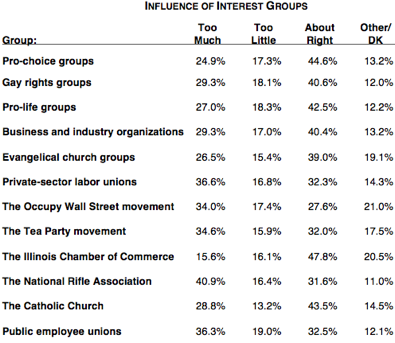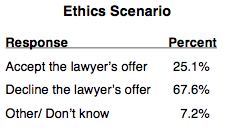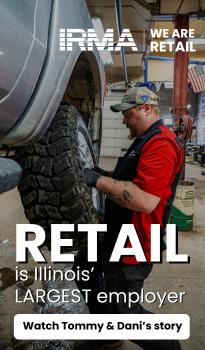Illinoisans split on campaign caps
Wednesday, Sep 26, 2012 - Posted by Rich Miller
* The Paul Simon Public Policy Institute’s latest poll found that Illinoisans are split on what to do about campaign caps…
About half (46.0 percent) agreed that “Limits on campaign contributions are necessary to prohibit corruption and maintain the confidence of the public in politics. Complete disclosure of contributions is important, but it is not enough.”
Slightly more (49.2 percent) chose the statement that “Contribution limits do not work. Money always finds a way to influence politics. The best way to ensure the integrity of politics and maintain the confidence of the public is to eliminate contribution limits and to require complete, immediate disclosure of all contributions.”
• Among those most likely to say contribution limits are necessary were the college-educated (53.8 percent), self-described liberals (53.9 percent), and respondents in households with incomes above $100,000 (52.0 percent).
• Among those most likely to favor disclosure requirements over contribution limits were the high-school-educated (57.4 percent), conservatives, (55.6 percent), political independents (56.6 percent), and respondents in households with incomes below $50,000 (54.2 percent).
* The poll also asked whether various groups had too much influence in Springfield or not enough…

From the Institute…
The “too much influence” responses range from a low of 15.6 percent for the Illinois Chamber of Commerce (also note its higher-than-average “don’t know” response) to a high of 40.9 percent for the National Rifle Association. Not much jumps out at the reader in terms of patterns, with “about right” being the modal response in most categories. The Occupy Wall Street and Tea Party movements, for example, draw “too much” responses from about a third. Pro-choice and pro-life groups draw similar ratings to each other, with about a quarter saying each has too much influence.
Business and industry groups (29.3 percent)—as well as the aforementioned Illinois Chamber of Commerce—were less likely to be seen as having too much influence than were labor groups, whether public employee unions (36.3 percent) or private sector unions (36.6 percent).
* The Citizens United case is hugely opposed by Illinoisans…
The Institute asked about the Supreme Court’s Citizens United decision for the first time in the 2012 poll. Interviewers told respondents that “the U.S. Supreme Court decided that corporations and unions can spend unlimited amounts of money to directly support or oppose political candidates. Before the ruling, corporations and unions could not.” They were asked whether and to what extend they favored or opposed the ruling.
Two-thirds (66.5) of Illinois voters surveyed said they opposed the ruling, more than half (52.1 percent) strongly opposed it. One in four (25.4 percent) either strongly or somewhat favored the Citizens United Ruling.
• Most likely to strongly oppose the Citizens United decision were college-educated respondents (59.5 percent) and liberals (63.0 percent).
• Strong opposition was higher in Chicago (57.5 percent) than in its suburbs (51.6 percent) or downstate (49.5 percent).
• As one might guess, Republicans (32.2 percent strongly/ somewhat favor) and self-described conservatives (30.7 percent) were more likely than average to favor the Court’s decision. Among Democrats, 12.5 percent strongly or somewhat favored the Citizens United decision, and among independents, 19.8% favored the decision.
* And they want at least a one-year ban on lobbying by former elected officials…
Next, about former elected officials as lobbyists, which statement comes closer to your views?
To reduce the likelihood or the perception of corruption, or trading votes for money, politicians should be prohibited from lobbying
their former colleagues for one year after leaving office. 68.5%
Organizations hire former legislators for their expertise in the lawmaking process. Contacting governmental officials is a constitutional right for anyone and should not be regulated–even for former elected officials. 25.4%
Other/Don’t know 6.1%
* Illinoisans also think that corruption in Illinois business is pretty bad, but not as bad as it is in state government…
In regards to corruption, would you say corruption in Illinois business is widespread or not?
Yes 62.3%
No 26.3%
Other/Don’t know 11.4%
And what about in state government? Would you say corruption in Illinois government is widespread or not?
Yes 76.8%
No 16.3%
Other/Don’t know 7.0%
Compared to other states, do you think Illinois state government is more corrupt than governments in other states, less corrupt than in other states, or do you think it is about the same?
More corrupt 58.0%
Less corrupt 2.1%
About the same 36.6%
Other/Don’t know 3.2%
What about in your city or area of the state? Is your local government more corrupt than government in other parts of Illinois, less corrupt, or do you think it is about the same?
More corrupt 18.7%
Less corrupt 35.8%
About the same 41.6%
Other/Don’t know 3.9%
* For years, University of Illinois political scientist Jim Nowlan has been posing an ethical scenario like this one to his students…
Next, I want to get your thoughts on a scenario I’m going to read to you: Let’s say that you have a close relative who has just been arrested on a serious charge of driving under the influence of alcohol. He is in his first job out of college and cannot do his job without a driver’s license. His wife is pregnant with their first child.
Your relative has hired a veteran lawyer who says he knows his way around the courthouse. The lawyer says that if your relative provides him $1000 in cash, in addition to his fee, he is confident that he can have the charge dismissed. Your young relative has asked for your advice. Would you tell him to accept or decline the lawyer’s offer?
* This is what the Simon Institute found when it asked the question…

* Methodology…
For answers to these questions, the Institute surveyed 1,261 registered voters across the state, September 4 through 10, resulting in a statistical margin for error of plus or minus 2.77 percentage points. The questionnaire was available in both English and Spanish, and the sample included both land lines and cell phones. The Simon Institute developed the questionnaire, and phone interviews were administered by Customer Research International of San Marcos, Texas, which reports no Illinois political clients. The Institute paid for the project out of non-state funds from its endowment.
More on the poll later today.
















- The Captain - Wednesday, Sep 26, 12 @ 10:38 am:
I’ve never understood this backwards thinking “Limits on campaign contributions are necessary to prohibit corruption”. Two things about campaign fundraising are not in question: 1) it’s very necessary, 2) it’s very difficult. How is it rational that by reducing the number of people/entities available to contribute and reducing the amounts they can contribute it will lead to candidates who are less desperate and less willing to break the law to get the funds they feel are necessary? This makes no sense.
Even if you’re just trying to reduce the influence of money in politics this fails the rational/logical test. The result is that the candidates become more beholden to the smaller pool of influencers who are able to round up large numbers of compliant contributions. Limits on sources and amounts of funds produce the opposite of the intended result, this is not rational policy.
- Carl Nyberg - Wednesday, Sep 26, 12 @ 10:39 am:
34.0% said the Occupy Wall Street movement has too much influence in Springfield?
We live in a state full of fools.
What influence has OWS exercised in Springfield?
The media should be ashamed of itself for presiding over such rank ignorance.
- Carl Nyberg - Wednesday, Sep 26, 12 @ 10:44 am:
I think Illinois should explore modifying the Senate and House as follows.
The Senate would be elected from districts that elect six senators. The top six vote getters are elected.
The House would be composed of people picked at random for 12 year terms. But the people would have the power to recall their representative and have a new one picked at random.
One chamber would be focused on raising money, but the other chamber wouldn’t care much about raising political money.
- Shore - Wednesday, Sep 26, 12 @ 10:50 am:
we’ve had 10+ years of “ethics” campaign discussions, I know it’s important, but voters are sick of it which is why pat brady’s democrats are corrupt messaging isn’t selling even with republicans. I know junkies and especially journalists love it, but it’s like the enviornment at this point-a 4th tier issue.
- Colossus - Wednesday, Sep 26, 12 @ 11:02 am:
Campaign $: Public financing combined with state-supported web resources. How to pay for it? I think CME and Sears might have an idea, though I doubt they’d like it.
Ethics question: Man that’s a doozy. Shouldn’t the lawyer just build the $1K into his fee and not mention the rest of it to the accused? The lawyer’s in too deep already, no point in exposing himself to danger just to have it fall apart down the line. (This is what happens to your brain when you live in IL, I guess…)
- Team Sleep - Wednesday, Sep 26, 12 @ 11:12 am:
I am intimately involved in raising money for a candidate who ran for a similar office before the caps were put in place. If anything, I think the caps put even MORE influence on legislative leaders and create an even bigger mad scramble for money from big-time PACs like Chamber PAC, IMPAC, SEIU’s PAC, AFSCME, etc. Many companies and larger private donors seem to be ham-fisted when it comes to divvying out the checks because they can now use the limits as a crutch. Along a similar note, it allows fundraisers or campaign chairmen with corporate or union connections to bundle. That’s not exactly a savory task.
Corruption will always be here. Blago took it to a whole new level and people overreacted. So now a wealthy candidate or someone who has deep connections to PAC leaders can bankroll a campaign without a lot of fundraising efforts.
- wordslinger - Wednesday, Sep 26, 12 @ 11:23 am:
Who knew Occupy Wall Street had such pull in Springfield?
- walkinfool - Wednesday, Sep 26, 12 @ 11:36 am:
The real impact of lobbies is very hard to judge by those from outside the government. My own view of who’s got real power to influence votes and budgets, disproportionate to their general public support, is very different from the table above.
IMHO: The Tea Party, OWS, evangelical churches,and government labor unions, are not as strong as the table suggests. The Catholic church should be seen as stronger since they are effectively the Pro-life lobby, and NRA power is even more overblown than suggested. Most industry groups hold their own, but the Insurance lobby is disproportionately powerful. The teachers’ unions, and the out-of-state education reform groups are canceling each other out for now.
The poll answers are really about what individuals in the public think about various policy positions, and why some became law, despite being disliked by them.
- Empty Chair - Wednesday, Sep 26, 12 @ 11:47 am:
Rich, if you were to rank those groups in terms of influence, how would you rank them?
- cermak_rd - Wednesday, Sep 26, 12 @ 11:59 am:
re the ethics question: I guess I’d want to know what the $1000 was for. If it was for a bribe, then that’s right out. If it was for a more than usual vigorous defense involving drowning the court in motions, paperwork, etc. until someone cried uncle or offered supervision, then I would not consider that unethical.
- rc - Wednesday, Sep 26, 12 @ 12:08 pm:
Half the people in the poll think it’s “about right” that we’re governed by the dictates of corporate lackeys at the C of C. Another 16% think that we should bend over even further.
Hey, Lewis! It’s working great!!
- ZC - Wednesday, Sep 26, 12 @ 12:20 pm:
Very interesting, though I wish the Simon Institute had posed the following Door 3:
“Contribution limits do not work. Money always finds a way to influence politics. Full disclosure of campaign contributions is also a violation of the privacy rights of individuals because those who donate to political candidates may face intimidation or harassment by being seen as supporting unpopular candidates. Thus, contributions should be unlimited and there should be no full disclosure of them.”
That’s the moral world they’re trying to start sketching in D.C., after all.
- Cook County Commoner - Wednesday, Sep 26, 12 @ 12:23 pm:
Regarding the ethics question, that sort of hypothetical is useful in gauging a person’s trust of the justice system he or she is subject to. Considering the low marks business and government received, the justice system apparently is still viewed as relatively clean and respondents, at least on paper, favor conduct which maintains that perception.
But questions like that are much like political discussion where it’s said that many who talk right wing actaully vote left wing.
I’ll bet my lifetime membership as a cynic that most people would pay the dough if placed in that spot, so long as they had a reasonable expectation of success. I wouldn’t because the deals sounds too good. In Cook County, the lawyer would want $5000 and $5000.
- LN - Wednesday, Sep 26, 12 @ 2:03 pm:
I think the results from the ethics question are kind of inflated. I think many of those who answered “no” did so because they didn’t want to seem like an unethical person. Here’s a situation that I always felt was odd: I used to work in an elected official’s office. We would get calls frquently from constituents whose relative was in jail, or had gotten some kind of police ticket, and the constituents would always ask “if there was anything [the elected official] could do” for them. I think the harsh reality in Illinois is that citizens publicly say they are opposed to corruption but because they know corruption exists, they are willing to pursue it.
- 1776 - Wednesday, Sep 26, 12 @ 7:12 pm:
The Illinois Chamber in last place again!!! Too many eggs in one basket - Tom Cross.
- G. Willickers - Thursday, Sep 27, 12 @ 6:59 am:
That study tells us ALEC has done a superb job of keeping itself hidden outside of the Capitol Dome.